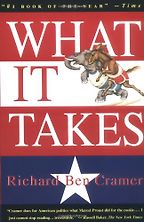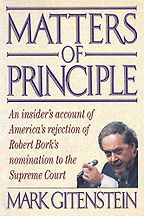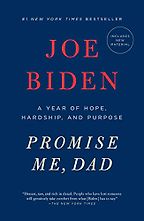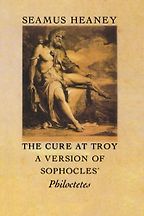Your qualifications as a Washington wiseman and Biden-ologist are unsurpassed: Harvard Law Review editor, Recount Chair for Al Gore, Obama’s infectious disease czar, Chief Counsel to the Senate Judiciary Committee Joe Biden chaired, and Chief of Staff to President Biden. Before discussing the books you’ve chosen about him, please give us a peek at the Joe Biden behind the aviators.
The most revealing truth about Joe Biden is that what you see is what you get. He’s genuinely avuncular. He connects to the people he meets, whether they’re people who work for him, or people on the campaign trail. The stories about how he stays in contact with a young person coping with a stutter or a grieving parent—they’re just the tip of the iceberg. He cares and it’s real. When my father passed away, in 1995, it had been three years since I worked for Joe Biden, but his was the very first phone call I got.
What is not obvious about him?
People may not appreciate how much he digs into details. Anyone who briefs him on any topic knows that the briefing goes on as long as is allowed—and then some. He’s interested in all the facts, even those that do not line up with his preconceptions. In the years I worked for him in the White House, he took calls from Governors and Senators without regard to political party. And he sought out informed opinions from across the spectrum on what worked, what wasn’t working, and what needed to be changed.
To what extent is Joe Biden explained by descriptors like ‘old’, ‘white’ and ‘male’?
He is certainly older, and he’s definitely a white man. He understands that our lived experiences do shape our capacity to understand. But empathy is Joe Biden’s key attribute. He has always listened, learned, and led with empathy. For instance, based in part on his conversations with same-sex couples and their children, Joe Biden was among the first national-level political figures to come out for marriage equality back in 2012. He makes it his mission to see beyond the limits of his firsthand experience.
That brings us to your first book on Joe Biden, What It Takes by Richard Ben Cramer.
This account of the ’88 presidential campaign is my all-time favorite campaign book. Richard Ben Cramer was a brilliant observer and writer. Full disclosure, I appear on one page of this 700-page book, as a bit player on Biden’s campaign.
Many people who know Joe Biden did not like the way he was portrayed in this book, and I certainly don’t agree with all of it. What it Takes is unvarnished; it really shows you the intertwining politics and personalities of the participants in a campaign which had open, competitive primary races on both sides. The book portrays three Democrats and three Republicans. It’s a fascinating read.
What are the salient facts about Biden’s previous presidential runs?
When he entered the race for the election of ‘88, he was a very young candidate in a very competitive field, which included Governor Michael Dukakis (who became the nominee), Al Gore (who become Vice President in ‘93), Dick Gephardt (who became the leader of the Democrats in the House), and Reverend Jesse Jackson, the first African American to win a presidential primary. It was a field packed with political talent.
“Joe Biden had to balance the future of the Court and the Constitution against his campaign”
As this campaign was starting, Justice Powell resigned from the Supreme Court and Joe Biden, as the Chairman of the Senate Judiciary Committee, had to balance the future of the Court and the Constitution against his campaign. In the middle of all that, he gave a speech in Iowa where he didn’t attribute remarks from Neil Kinnock that he had attributed on many previous occasions. He decided to drop out of the primary and even offered to step aside as chairman of the Judiciary Committee.
The impression abounds that Biden was a quadrennial candidate.
He ran twice before. He dropped out of ’88 race in the summer of ’87, before any caucuses were held, after a couple of months. And he dropped out of the 2008 race after he was defeated in the first caucus.
The book Matters of Principle is the next title you’ve selected on Biden.
Matters of Principle tells the story of how the nomination of Judge Robert H. Bork to the Supreme Court was defeated in the Senate. We live in a time where all Supreme Court nominations become battles; in 1987, it had been decades since there was a fight over a nomination. Judge Bork, one of the nation’s most prominent conservative jurists, was widely acclaimed as the logical conservative nominee. When he made the nomination, Ronald Reagan was a popular second term president. Almost all the experts said that Joe Biden, who was then the Chair of the Judiciary Committee, would not be able to put together the fight to beat Bork. But he did. And in the end, it was a bipartisan vote—six Republicans voted with most Democrats to defeat Bork’s nomination.
Get the weekly Five Books newsletter
I will say directly, for younger people, the reason we have abortion rights in America is because Joe Biden—along with others—fought the confirmation of Bork, and Anthony Kennedy was put on the Supreme Court in his place. For decades, we had a narrow majority on the Court to preserve abortion rights because Joe Biden won the fight to beat Robert Bork. And Justice Kennedy became the key vote in creating marriage equality, in the Obergefell decision. Joe Biden’s decision to put the Constitution and the wellbeing of our country ahead of his campaign says a lot about who he is.
‘Sleepy Joe’ is the nickname that President Trump uses to suggest that Biden does not have ‘what it takes.’ Gitenstein’s depiction of Biden’s intellectual agility during the Bork incident contradicts the caricature of Biden as a bumbler.
Read Mark’s book, or go online and watch the Judiciary Committee Hearings. The exchanges between Joe Biden and Robert Bork were unscripted, substantive back-and-forth about issues of unenumerated rights, the reach of the 14th and 5th amendments, the equal protection clause and the right to privacy. Bork was considered one of the leading constitutional scholars of the time, a professor of constitutional law at Yale Law School, and a member of the D.C. Circuit Court of Appeals, the most prominent court aside from the Supreme Court in the United States. People can watch the exchanges between Biden and Bork and judge for themselves whether or not ‘Sleepy Joe’ is the right nickname.
Where the Light Enters, by Dr. Jill Biden, is your third selection.
When I first went to work for Joe Biden, his chief-of-staff, Ted Kaufman, told me ‘There’s no person in America who’s been unluckier and luckier than Joe Biden.’ What Ted meant was Joe Biden was a kid from Scranton who got himself elected to the Senate at an age too young to even take office. Biden became one of the most effective and accomplished members of the Senate, responsible for major legislation and much more, then went on to become Vice President.
“A few weeks after he was elected to the Senate, his wife and infant daughter were killed in a car crash”
There’s a lot of good fortune in that. On the other hand, he suffered a string of terrible tragedies. A few weeks after he was elected to the Senate, his wife and infant daughter were killed in a car crash, which also severely injured his two sons. In 1988, he was lucky to survive dual aneurysms. And in 2016, his older son Beau passed away from brain cancer. Anyone who knows Joe Biden would say that meeting Jill Jacobs, several years after his first wife’s death, was among his greatest strokes of luck.
She became a mother to his sons and they had a daughter, Ashley. For the past, 40 years, Jill has been his partner in love and loss. Dr. Biden likes to call herself a Philly girl. She’s tough. Anyone who saw the video, from early March, of an election night where she pushed back a protester who was rushing her husband, knows it.
Five Books interviews are expensive to produce. If you're enjoying this interview, please support us by donating a small amount.
In this book, you see Dr. Biden coping with the loss of their son, Beau, and its impact on the family. Her candor comes through. You get an authentic sense of the woman who I hope will be America’s next First Lady.
Promise Me, Dad is not an unexpected choice, as it’s a book by Joe Biden himself. Tell us about this one and what might surprise readers in it.
The title Promise Me, Dad comes from one of the last conversations the Vice President had with his son, before he passed. The promise that Beau asked from his dad was not about running for office; it was about staying engaged in making the country a better place, because Beau knew that public service is what keeps Joe Biden ticking. Promise Me, Dad is about how Joe Biden coped with his son’s decline while continuing his role as one of the most active and effective Vice Presidents in America’s history. It’s written in the near present tense and it gives you a really good sense of the person.
A humdrum question: Biden mentions being ‘sheriff’ of the American Recovery Act. What does that mean? And more broadly, what was his role in the Obama administration, behind the scenes?
In 2009, the Obama-Biden administration took over at a time of horrible economic circumstances, which we now refer to as the Great Recession. At the urging of Obama and Biden, Congress passed the American Recovery and Restoration Act. President Obama asked Vice President Biden to oversee its implementation and gave him the nickname ‘Sheriff Joe,’ which entailed two jobs. One, to make sure that the programs in the bill—for instance, programs to kickstart the creation of a green economy—got implemented quickly so that the money that was supposed to get out to people was received quickly. His other job was to make sure that the money didn’t get wasted. The Vice President set up mechanisms so that taxpayers could see where their tax dollars were going, in real time, through recovery.gov. He policed the process. If there was a program that wasn’t getting going, he’d light a fire under the responsible party to get it started. He was on the phone with governors and mayors every day.
“Joe Biden has what he would describe as a very Irish soul”
One incident, written up in a wonderful book called The New New Deal, tells the story of Vice President Biden seeing a Republican Senator from Kansas critiquing how the Recovery Act was working in his state on CSPAN. The VP got the Secretary of Transportation on the phone right away to fix it. The Senator went out the next day and said Joe Biden did what was responsible and I appreciate it. So, he was called ‘Sheriff Joe’ because he was on top of things and even-handed in ensuring the general good.
The Cure at Troy, a 1991 verse adaptation of a play by Sophocles by Irish Nobelist Seamus Heaney, is your final choice.
The Vice President loves Irish poetry. Heaney is one of his favorites. He often quotes the last of these lines: “The longed-for tidal wave / Of justice can rise up / And hope and history rhyme.” Joe Biden has what he would describe as a very Irish soul, a very Irish mindset. A view of the world that says tragedy happens. There are good days and bad days. You need to celebrate the good days and get through the bad days and make the most of those times when hope and history rhyme.
The Vice President has quoted Heaney, among other poets, at length and seemingly from heart, for decades. But I think The Cure at Troy has taken on new resonance. It’s about an archer discarded by his fellow warriors because of his battle wound, who finds his bow is needed by the Greeks to win the Trojan War.
It is fitting, I suppose. I definitely feel like the Biden 2020 campaign is an epic odyssey—perhaps all campaigns are, but this one more than most. At this moment, Joe Biden’s attributes uniquely qualify him to lead the way toward, as he would say, restoring the soul of America.
Interview by Eve Gerber
May 13, 2020. Updated: March 16, 2022
Five Books aims to keep its book recommendations and interviews up to date. If you are the interviewee and would like to update your choice of books (or even just what you say about them) please email us at [email protected]










